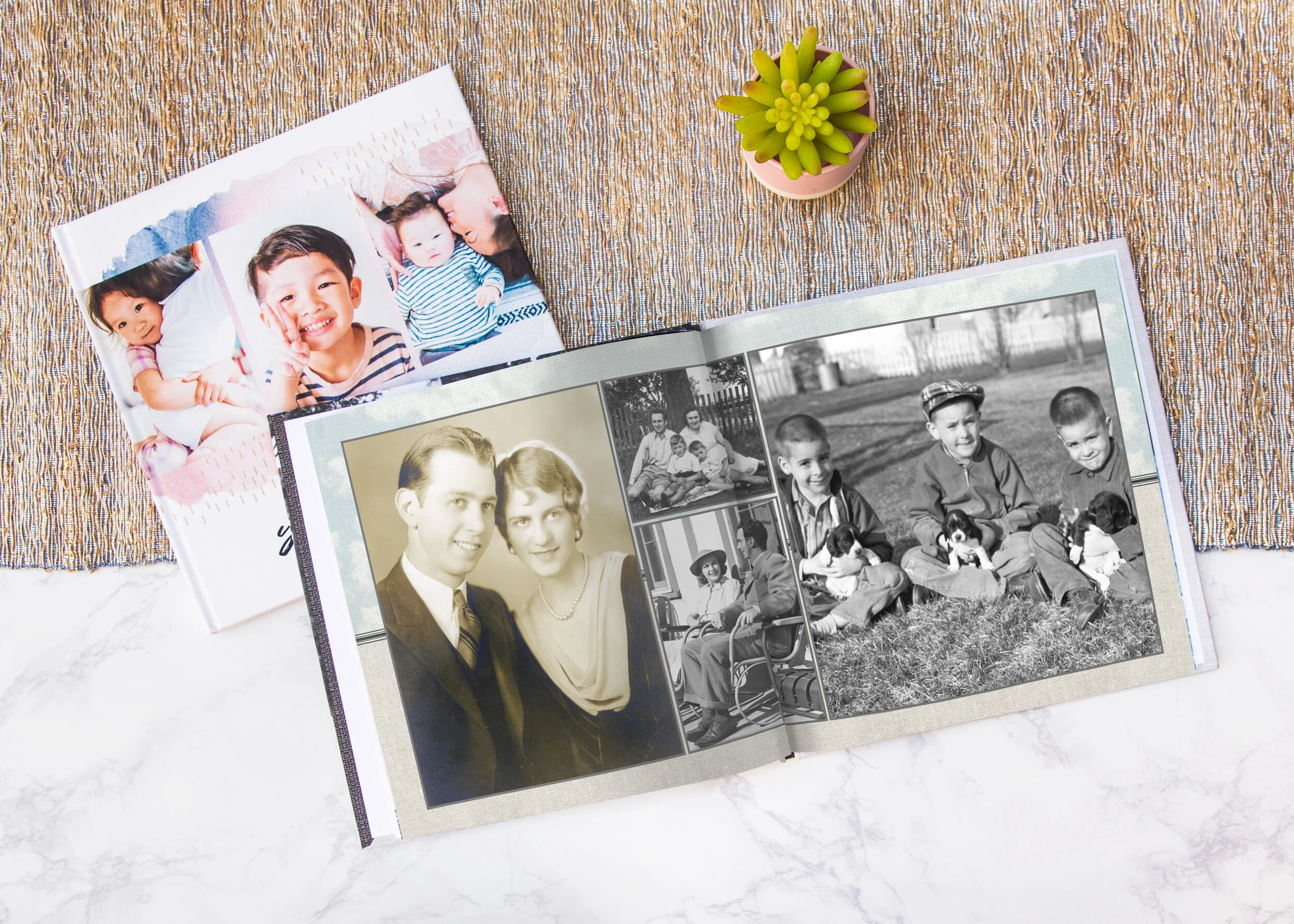How To Create a Collaborative Family Cookbook
Home and Family Recipe Books with Photos
Everyone in my family loves to cook and eat great food—and it’s always been that way. My sister and I grew up cooking with our mom, who—before it was trendy—chose farmer’s market produce and experimented with vegetarian options. She also always cooked from scratch, which I have always admired and emulated. Spending time in the kitchen together was one of our most common family activities, and it’s what solidified cooking as a way to bond with each other over the years. The kitchen is our abiding happy place, but that doesn’t mean what we’ve prepared hasn’t evolved over the years. My sister and I are in the process of creating a collaborative family cookbook that traces the origins of our family recipes and captures the way we eat with the families that we’ve started. Once it’s done, we’ll gift the photo book to all the grandparents—and keep copies for ourselves and our children. Here are some of the ways we’re making it personal:
1. Upload Tattered Handwritten Recipes
Almost exactly ten years ago (whew, time flies!), my mother and soon-to-be mother-in-law threw me a surprise wedding shower. As a wonderfully personal gift, everyone who came hand wrote their favorite dish on a recipe card for me. Just this past week, my husband’s grandmother passed away, and I’m so grateful to have a few of her signature recipes written out in her own hand to remember her by. Instead of rekeying her instructions, I chose to scan and upload the recipes right into our cookbook along with her photo.
2. Scan Vintage Family Photos
The retro theme of the “What’s Cookin” Mixbook photo book template lends itself beautifully to showcasing vintage photos of family members. For the recipes that have been around for decades, include a classic portrait to weave a sense of history into your project. You can even convert your photos to black and white or sepia tones right in the Mixbook editor.
3. Uncover a Lost Family Tradition
Perhaps there’s a dish your parents or grandparents remember from their childhood. Ask them to dig up an old recipe, or find a recipe online that approximates their taste memory. Once you find one that everyone likes, you can update it with local ingredients and modern sensibilities to create a new family recipe with a strong nostalgic tie to the past.
4. Establish a Few New Traditions
My sister and I didn’t grow up making bunny cakes on Easter, but for whatever reason it’s become a new family tradition. Each year we try to out-bunny-cake each other. Our new tradition is really good spirited fun with a pretense of cutthroat competition, which our bizarre senses of humor find hilarious. Something about the innocence of making a bunny cake juxtaposed with smack talk is inherently funny to us. A page in our book is dedicated to pitting bunnies against one another.
5. Weave In a Little Humor
Beyond our silly bunny cake humor, my sister and I love to tease my mom about how she’ll say she’s going to “fix” dinner. Growing up in Pennsylvania, that was the accepted colloquial language. Now that we’ve moved to parts of the country where nobody talks about “fixing” dinner, we love to ask her how dinner has broken! On a page dedicated to my mom’s favorite recipe, I’ve included an homage to my handy mother who can always fix dinner.
6. Include Photos of Tablesettings & Family Meals
In our family, the tablesetting is just as important as the meal itself. I’m not talking fancy—just artful. My dad didn’t typically cook when I was a kid (though like many dads he worked the grill like a pro and flipped a mean Mickey Mouse pancake), but he got involved in meal prep by setting a beautiful table no matter how insignificant the meal. A designer by trade, he simply couldn’t help himself—and it’s a tradition my sister and I carry on with our families. My dad’s signature was creating a flourish of a napkin inside a water goblet, but there are many other variations on a well-set table in my family, which are worthy of capturing in photographs and sprinkling through our book.
7. Showcase Step-by-Step Close-Ups
Beautiful food photography is quite compelling, and even more so when it’s of the food you know and love. Borrow a page from celebrity chef cookbooks and snap shots of your favorite dishes styled on family dinnerware. Whether your plates are perfectly campy or beautifully heirloom, your photographs will be deeply meaningful.
8. Tell a Few Stories
From the time I was experimenting with cooking falafel in a hotplate on top of my parents’ brand-new counter and it split right down the middle (oops) to the time we were frantically trying ridiculous ways to thaw the turkey in the hours before Thanksgiving dinner, we have lots of classic family stories that revolve around meals. My sister and I plan on identifying four or five classic tales of kitchen follies, and writing out a short story or haiku that captures the memory, which will go down for the ages as family lore.
9. Interview Family Members
Consider interviewing family members from 2 to 102 about their favorite foods, guilty pleasures, and meal memories. Getting the answers down in print will be interesting now—and in twenty years when kids and grandkids page through your family cookbook. You may be surprised how the more things change, the more things stay the same.
10. Commission Some Artwork
Everyone loves artwork created by children. Have the kids in your family draw pictures of their favorite meals, plus some of the recipes you plan to feature in the book. You can even have them write down family kitchen rules like “mom says: please do not put the tomatoes in the fridge” to add a little humor and personality to your favorite recipe pages.






